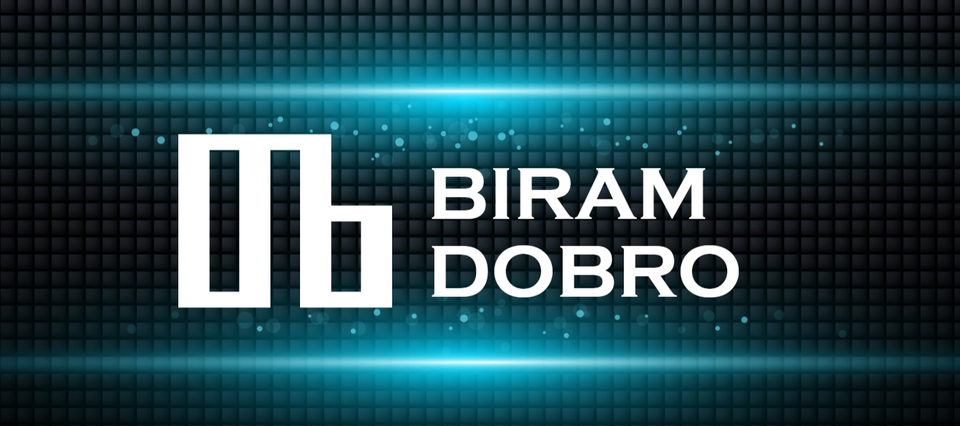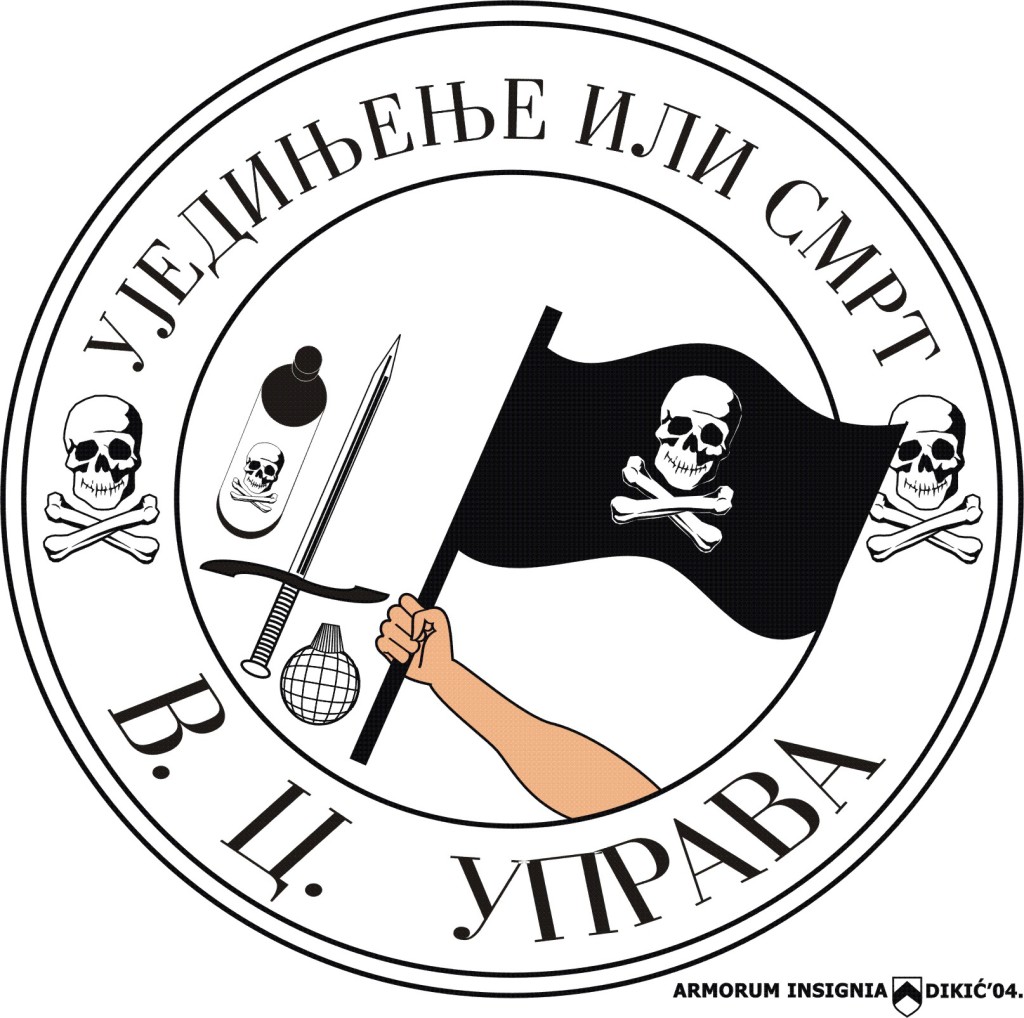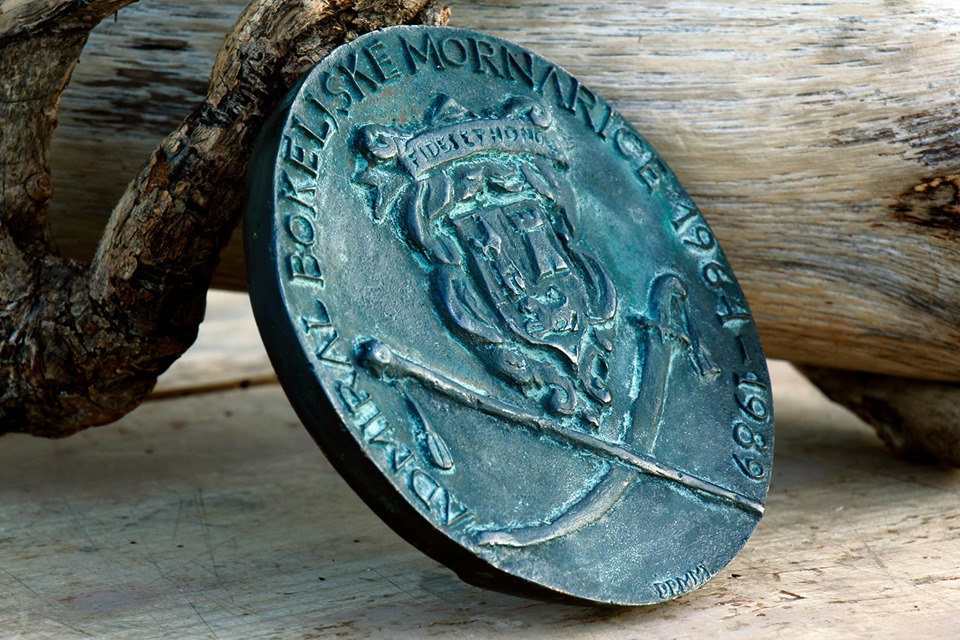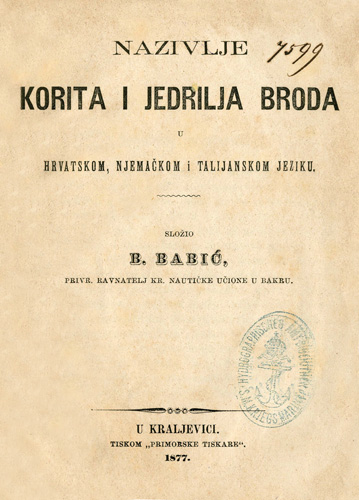Na teritoriju Osmanskog Carstva organizirali su više terorističkih akcija, a upravo pod njihovim pritiskom Srbija je ušla u dva Balkanska rata (1912. – 1913.) u kojima je izvojevala pobjedu i teritorijalno se proširila.
Srpski časnici, koji su 1903. godine ubili kralja Aleksndra Obrenovića i njegovu suprugu, 9. svibnja 1911. godine osnovali su tajnu organizaciju Ujedinjenje ili smrt. Glavni organizator bio je pukovnik Dragutin Dimitrijević Apis, a skupina je u povijesti ostala poznata kao Crna ruka. Na pečatu organizacije bila je prikazana ruka koja drži razvijenu zastavu s mrtvačkom glavom i ukrštenim kostima, nož, bomba, bočica s otrovom i natpis “Ujedinjenje ili smrt”. Iako je bila tajna, skupina je imala prešutnu potporu srpskih vlasti, naročito u krugu oko prijestolonasljednika Aleksandra Karađorđevića. Kako je tadašnji kralj Petar Karađorđević Apisu i društvu oko njega dugovao dolazak na prijestolje osigurao im je mjesta na dvoru i u kraljevskoj gardi. Također, imali su odlučujući utjecaj u premještanju, unapređivanju i umirovljenju časnika.
Crna ruka u suštini je bila teroristička i militaristička organizacija, a glavni cilj bio joj je ujedinjenje Srba u jednu državu. Kako stoji u njihovom programu, taj cilj mogao se postići jedino revolucionarnom borbom protiv Austro-Ugarske i Osmanskog Carstva.
Još prije osnivanja organizacije skupina časnika predvođenih Apisom ubacivala je operativce na jug Srbije i u Makedoniju koji su tada bili pod osmanskom vlašću. Također, razvili su mrežu doušnika u Austro-Ugarskoj i uspostavili blisku suradnju s revolucionarnom organizacijom Mlada Bosna.
Crna ruka djelovala je i na potkopavanju Crne Gore, no atentatori i ustanici te organizacije tamo su spriječeni uhićenjima, suđenjima i streljanjima. Djelovanjem na teritoriju Osmanskog Carstva organizirali su više terorističkih akcija, a upravo pod njihovim pritiskom Srbija je ušla u dva Balkanska rata (1912.-1913.) u kojima je izvojevala pobjedu i teritorijalno se proširila. Članovi Crne ruke čak su pokušali ubiti i grčkog kralja koji je bio pronjemački orijentiran.
Apis i njegovi suučesnici odgovorni su i za atentat na prijestolonasljednika Franju Ferdinanda u Sarajevu, jer su teroriste iz Mlade Bosne naoružali i prebacili na teritorij BiH. Cilj im je bio gurnuti Austro-Ugarsku u rat (isprva su računali da će Njemačko carstvo ostati po strani) u kojem su očekivali pobjedu uz potporu Rusije, Francuske i Velike Britanije. Ipak, stvari su krenule drugim tijekom te je srpska vojska poražena od združenih austro-ugarskih i njemačkih snaga, pa se morala povlačiti prema jugu.
Nako što se srpska vojska s kraljem, prijestolonasljednikom i političkim vodstvom, povukla na otok Krf, dolazi do preokreta. Naime, princ Aleksandar i predsjednik vlade Nikola Pašić uvidjeli su opasnost od sve veće moći Crne ruke, te su je odlučili neutralizirati. Godine 1917. organizirano je namješteno suđenje, u povijesti poznato kao Solunski proces, nakon kojeg su Apis i dvojica njegovih najbližih suradnika osuđena na smrt streljanjem. Ostalim urotnicima određene su zatvorske kazne, ali su 1919. godine odlukom princa Aleksandra (koji je u stvari vladao umjesto starog i bolesnog oca Petra) amnestirani. U vrijeme komunističke Jugoslavije presude Solunskog procesa su poništene, a osuđenici su proglašeni nevinima.
Povijesna je činjenica da je ideologija i djelovanje Crne ruke imala odlučan utjecaj na razvoj srpskog šovinizma i kasnijeg četničkog pokreta te ideje o Velikoj ili Nebeskoj Srbiji. Sažeto u slogan: “Svi Srbi u jednoj državi”.
piše: Dražen Krajcar
Izvor: povijest.hr
The Constitution of the Ujedinjenje ili Smrt –
Unification or Death
I. Purpose and Name
Article 1. For the purpose of realising the national ideals – the
Unification of Serbdom – an organization is hereby created, whose
members may be any Serbian irrespective of sex, religion, place or
birth, as well as anybody else who will sincerely serve this idea.Article 2. The organisation gives priority to the revolutionary struggle
rather than relies on cultural striving, therefore its institution is an
absolutely secret one for wider circles.Article 3. The organization bears the name: “Ujedinjenje ili Smrt”.
Article 4. In order to carry into effect its task the organization will
do the following things:(1) Following the character of its raison d etre it will exercise its
influence over all the official factors in Serbia – which is the Piemont
of Serbdom – as also over all the strata of the State and over the
entire social life in it:(2) It will carry out a revolutionary organisation in all the
territories where Serbians are living:(3) Beyond the frontiers, it will fight with all means against all
enemies of this idea:(4) It will maintain friendly relations with all the States, nations,
organisations, and individual persons who sympathise with Serbia
and the Serbian race:(5) It will give every assistance to those nations and organisations
who are fighting for their own national liberation and unification.II. Official Departments of the Organisation
Article 5. The supreme authority is vested in the Supreme Central
Directorate with its headquarters at Belgrade. Its duty will be to see
that the resolutions are carried into effect.Article 6. The number of members of the Supreme Central Directorate is
unlimited – but in principle it should be kept as low as possible.Article 7. The Supreme Central Directorate shall include, in addition to
the members from the Kingdom of Serbia, one accredited delegate from
each of the organisations of all the Serbian regions: (1) Bosnia and
Herzegovina, (2) Montenegro, (3) Old Serbia and Macedonia, (4) Croatia,
Slovenia and Symria (Srem), (5) Voyvodina, (6) Sea-coasts.Article 8. It will be the task of the Supreme Central Directorate to
carry out the principles of the organisation within the territory of the
Kingdom of Serbia.Article 9. The duty of each individual Provincial Directorate will be to
carry out the principles of the organisation within the respective
territories of each Serbian region outside the frontiers of the Kingdom
of Serbia. The Provincial Directorate will be the supreme authority of
the organisation within its own territory.Article 10. The subdivisions of the organisation into District
Directorates and other units of authority shall be established by the
By-Laws of the organisation which shall be laid down, and if need be,
from time to time amended and amplified by the Supreme Central
Directorate.Article 11. Each Directorate shall elect, from amongst its own members,
its President, Secretary and Treasures.Article 12. By virtue of the nature of his work, the Secretary may act
as a Deputy President. In order that he may devote himself entirely to
the work of the organisation, the Secretary s salary and expenses shall
be provided by the Supreme Central Directorate.Article 13. The positions of President and Treasurers shall be un-
salaried.Article 14. All official business questions of the organisation shall be
decided in the sessions of the Supreme Central Directorate by a majority
of votes.Article 15. For the execution of such decisions of the organisation, the
absolute executive power shall be vested in the President and the
Secretary.Article 16. In exceptional and less important cases the President and
the Secretary shall make the decisions and secure their execution, but
they shall report accordingly at the next following session of the
Supreme Central Directorate.Article 17. For the purpose of ensuring a more efficient discharge of
business, the Supreme Central Directorate shall be divided into
sections, according to the nature of the work.Article 18. The Supreme Central Directorate shall maintain its relations
with the Provincial Directorates through the accredited delegates of the
said provincial organisations, it being understood that such delegates
shall be at the same time members of the Supreme Central Directorate; in
exceptional cases, however, these relations shall be maintained through
special delegates.Article 19. Provincial Directorates shall have freedom of action. Only
in cases of the execution of broader revolutionary movements will they
depend upon the approval of the Supreme Central Directorate.Article 20. The Supreme Central Directorate shall regulate all the signs
and watchwords, necessary for the maintenance of secrecy in the
organisation.Article 21. It shall be the Supreme Central Directorate s duty
punctually and officially to keep all the members of the organisation
well posted about all the more important questions relative to the
organisation.Article 22. The Supreme Central Directorate shall from time to time
control and inspect the work of its own departments. Analogically, the
other Directorates shall do likewise with their own departments.III. The Members of the Organisation
Article 23. The following rule, as a principle, shall govern all the
detailed transactions of the organisation: All communications and
conversations to be conducted only through specially appointed and
authorised persons.Article 24. It shall be the duty of every member to recruit new members,
but it shall be understood that every introducing member shall vouch
with his own life for all those whom he introduces into the organisation.Article 25. The members of the organisation as amongst themselves shall
not be known to one another. Only the members of Directorates shall be
known personally to one another.Article 26. In the organisation the members shall be registered and
known by their respective numbers. But the Supreme Central Directorate
must know them also by their respective names.Article 27. The members of the organisation must unconditionally obey
all the commands given by their respective Directorates, as also all the
Directorates must obey unconditionally the commands which they receive
direct from their superior Directorate.Article 28. Every member shall be obliged to impart officially to the
organisation whatever comes to his knowledge, either in his private life
or in the discharge of his official duties, in as far as it may be of
interest to the organisation.Article 29. The interest of the organisation shall stand above all
other interests.Article 30. On entering into the organisation, every member must know
that by joining the organisation he loses his own personality; he must
not expect any glory for himself, nor any personal benefit, material or
moral. Consequently the member who should dare to try to exploit the
organisation for his personal, or class, or party interests shall be
punished by death.Article 31. Whosoever has once entered into the organisation can never
by any means leave it, nor shall anybody have the authority to accept
the resignation of a member.Article 32. Every member shall support the organisation by his weekly
contributions. The organisations, however, shall have the authority to
procure money, if need be, by coercion. The permission to resort to
these means may be given only by Supreme Central Directorate within the
country, or by the regional Directorates within their respective region.Article 33. In administering capital punishment the sole responsibility
of the Supreme Central Directorate shall be to see that such punishment
is safely and unfailingly carried into effect without any regard for the
ways and means to be employed in the execution.IV. The Seal and the Oath of Allegiance
Article 34. The Organisation’s official seal is thus composed: In the
centre of the seal there is a powerful arm holding in its hand an
unfurled flag on which – as a coat of arms – there is a skull with
crossed bones; by the side of the flag, a knife, a bomb and a phial of
poison. Around, in a circle, there is the following inscription, reading
from left to right: “Unification or Death”, and in the base: “The
Supreme Central Directorate”.Article 35. On entering into the organisation the joining member must
pronounce the following oath of allegiance:“I (the Christian name and surname of the joining member), by entering
into the organisation “Unification or Death”, do hereby swear by the Sun
which shineth upon me, by the Earth which feedeth me, by God, by the
blood of my forefathers, by my honour and by my life, that from this
moment onward and until my death, I shall faithfully serve the task of
this organisation and that I shall at all times be prepared to bear for
it any sacrifice. I further swear by God, by my honour and by my life,
that I shall unconditionally carry into effect all its orders and
commands. I further swear by my God, by my honour and by my life, that I
shall keep within myself all the secrets of this organisation and carry
them with me into my grave. May God and my comrades in this organisation
be my judges if at any time I should wittingly fail or break this oath!”V. Supplementary Orders
Article 36. The present Constitution shall come into force immediately.
Article 37. The present Constitution must not be altered.Done at Belgrade this 9th day of May, 1911 A.D.
Signed:
Major Ilija Radivojevitch
Vice-Consul Bogdan Radenkovitch
Colonel Cedimilj A. Popovitch
Lt.-Col. Velimir Vemitch
Journalist Ljubomir S. Jovanovitch
Col. Dragutin T. Dimitrijevitch
Major Vojin P. Tanksoitch
Major Milan Vasitch
Col. Milovan Gr. Milovanovitch
Izvor: lib.byu.edu







